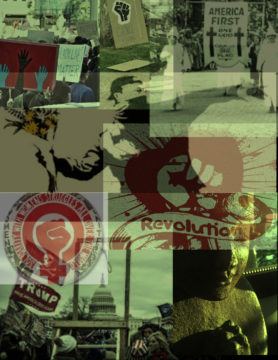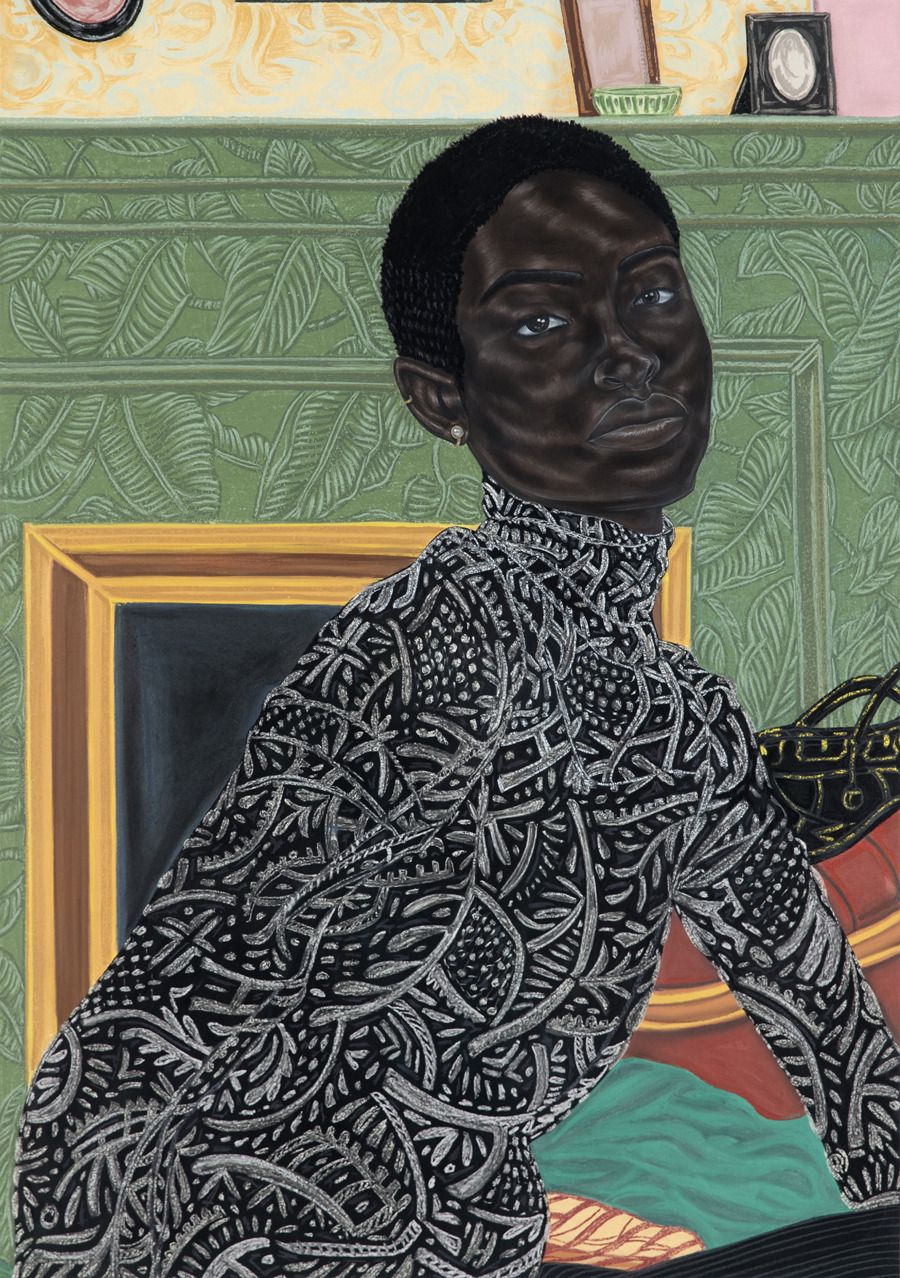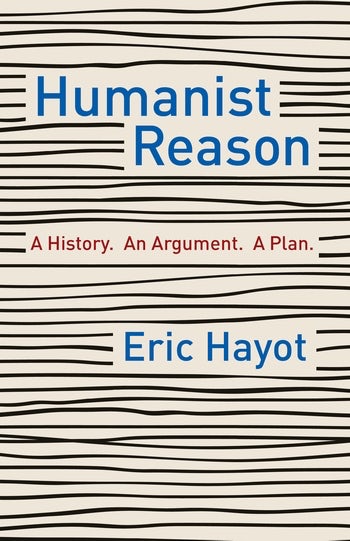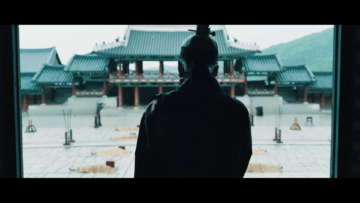by Usha Alexander
[This is the ninth in a series of essays, On Climate Truth and Fiction, in which I raise questions about environmental distress, the human experience, and storytelling. All the articles in this series can be read here.]
 —Change. Resilience. Where do we start? I’ve got no idea. What happens after this? Listen! The answer is here!—
—Change. Resilience. Where do we start? I’ve got no idea. What happens after this? Listen! The answer is here!—
These words, splashed on posters, jumped out at me from images sent by a friend. The posters were part of an exhibition called We Need To Talk About Fire, hosted at an artists’ gallery along the Nowra River, about halfway between Sydney and Canberra. The Nowra River region had been hard-hit by the catastrophic Australian bushfires of 2019–20, following an unprecedented drought. Fire season in Australia is worsening as the planet warms, just as it is in the western United States, the Amazon, and Siberia. And the 2019–20 Australian season was particularly horrific, igniting a follow-on spate of depression and suicides in the area. What struck me about these posters was the raw simplicity of their messages, which ranged from forceful platitudes to agonized queries.
In their talk about these bushfires of extraordinary fury, worsened by climate change, there’s no mention of technical solutions. No demand for new wind farms or lowered carbon intensity. Instead, the posters surface what so often gets buried beneath the statistics, acronyms, and cost-benefit analyses common in our dialogs on climate and environment. They voice the thoughts of people who narrowly escaped the flames as the sky burned. People who lost pieces of their lives in an incomprehensible inferno—loved ones or homes or a quietude of mind. For me, the posters recalled the millions more, elsewhere, who might also be expressing similar feelings: Survivors of entire towns leveled by fire in the western United States, from Paradise, California in 2018, to the several communities of Detroit, Blue River, Vida, Phoenix, and Talent, Oregon in 2020. Survivors of back-to-back typhoons Kenneth and Idai, the two most powerful cyclones ever to strike Mozambique, which hit within six weeks of one another, in March and April of 2019, fueled by rising sea surface temperatures. Survivors of typhoon Goni, the strongest recorded cyclone ever to make landfall anywhere, which hit the Philippines just days after typhoon Molave had hammered the same region, during the Covid-19 pandemic in October and November of 2020. Others too, for whom the damages and dangers of our rapidly changing planet must already feel immediate, existential, and relentless, eclipsing hopes for a return to “normalcy.” Read more »

 In 1940, at the height of Hitler’s invasion of Western Europe, Walter Benjamin, from Vichy France wrote, “The tradition of the oppressed teaches us that the ‘emergency situation’ in which we live is the rule. We must arrive at a conception of history that is in keeping with this insight.”
In 1940, at the height of Hitler’s invasion of Western Europe, Walter Benjamin, from Vichy France wrote, “The tradition of the oppressed teaches us that the ‘emergency situation’ in which we live is the rule. We must arrive at a conception of history that is in keeping with this insight.”
 Mourning is in season. Newspapers of record these days publish interactive mass obituaries, images of “ordinary” people fallen to “the opioid crisis” or to Covid-19 (the front page of the Sunday New York Times was recently riven down the middle by a monolith composed of thousands of dots, growing denser towards the base, each representing a victim of the virus: the whole reminiscent of the graphic tributes to 9/11). The inauguration of the US president in January featured, in lieu of most spectators, ranks of flags, symbolizing the past year’s losses. The annual observation of International Holocaust Remembrance Day in Germany, held this year as for the past quarter century on January 27 at the Reichstag in Berlin, featured a remarkable ceremony marrying reconciliation with the starkest grief. In his latest book, the memoir-cum-poetics Inside Story, Martin Amis eschews his characteristic charades in a sincere and extended eulogy for Saul Bellow, Philip Larkin, and Christopher Hitchens, three of the central figures in the author’s professional and affective life. And, 15 years after it first appeared, The Year of Magical Thinking, Joan Didion’s essay on death and bereavement, persists on various bestseller lists.
Mourning is in season. Newspapers of record these days publish interactive mass obituaries, images of “ordinary” people fallen to “the opioid crisis” or to Covid-19 (the front page of the Sunday New York Times was recently riven down the middle by a monolith composed of thousands of dots, growing denser towards the base, each representing a victim of the virus: the whole reminiscent of the graphic tributes to 9/11). The inauguration of the US president in January featured, in lieu of most spectators, ranks of flags, symbolizing the past year’s losses. The annual observation of International Holocaust Remembrance Day in Germany, held this year as for the past quarter century on January 27 at the Reichstag in Berlin, featured a remarkable ceremony marrying reconciliation with the starkest grief. In his latest book, the memoir-cum-poetics Inside Story, Martin Amis eschews his characteristic charades in a sincere and extended eulogy for Saul Bellow, Philip Larkin, and Christopher Hitchens, three of the central figures in the author’s professional and affective life. And, 15 years after it first appeared, The Year of Magical Thinking, Joan Didion’s essay on death and bereavement, persists on various bestseller lists. Unfortunately, it is always worth your time to read a book in praise of the humanities. Given the unenviable position of the humanities in public education and in contemporary cultural and (especially) political discourse about valuable expertise, any author that comes to their defense has to find a strategy to shift the narrative, and will thereby almost invariably do something interesting.
Unfortunately, it is always worth your time to read a book in praise of the humanities. Given the unenviable position of the humanities in public education and in contemporary cultural and (especially) political discourse about valuable expertise, any author that comes to their defense has to find a strategy to shift the narrative, and will thereby almost invariably do something interesting.
 Former Finnish President and
Former Finnish President and  I just spent two months living on the Caribbean island of Grenada. It’s a wonderful place with a somewhat antiquated healthcare system. To visit Grenada, I had to have a negative PCR test within 72 hours of flying. I was planning to go to a clinic and wait in line, which I’d done for a previous PCR test. I’d waited in line in the freezing cold for almost 3 hours. But a couple of weeks before my flight in January, Jet Blue let me know that Grenada was accepting PCR tests through a company called Vault who would mail me an at-home test. I signed up, they sent me the test, and three days before my flight, I logged onto a Zoom call with Vault from the comfort of my own living room. My test kit had a barcode and I had to show that to the technician on the Zoom. She then watched me spit into the vial with the barcode and instructed me how to package up the kit appropriately to send it back. I walked it over to UPS 30 minutes later, and within 48 hours, I received my results by email.
I just spent two months living on the Caribbean island of Grenada. It’s a wonderful place with a somewhat antiquated healthcare system. To visit Grenada, I had to have a negative PCR test within 72 hours of flying. I was planning to go to a clinic and wait in line, which I’d done for a previous PCR test. I’d waited in line in the freezing cold for almost 3 hours. But a couple of weeks before my flight in January, Jet Blue let me know that Grenada was accepting PCR tests through a company called Vault who would mail me an at-home test. I signed up, they sent me the test, and three days before my flight, I logged onto a Zoom call with Vault from the comfort of my own living room. My test kit had a barcode and I had to show that to the technician on the Zoom. She then watched me spit into the vial with the barcode and instructed me how to package up the kit appropriately to send it back. I walked it over to UPS 30 minutes later, and within 48 hours, I received my results by email. The Machine has me in its tentacles. Some algorithm thinks I really want to buy classical sheet music, and it is not going to be discouraged. Another (or, perhaps it is the same) insists that now is the time to invest in toner cartridges, running shoes, dress shirts, and incredibly expensive real estate.
The Machine has me in its tentacles. Some algorithm thinks I really want to buy classical sheet music, and it is not going to be discouraged. Another (or, perhaps it is the same) insists that now is the time to invest in toner cartridges, running shoes, dress shirts, and incredibly expensive real estate.
 Two profound horrors have plagued the world in recent times: the Covid-19 pandemic and the Trump presidency. And after years of dread, their recent decline has brought me a brief respite of peace.
Two profound horrors have plagued the world in recent times: the Covid-19 pandemic and the Trump presidency. And after years of dread, their recent decline has brought me a brief respite of peace. Whenever I discover a band that sports an accordion in the lineup, I’m ready to listen.
Whenever I discover a band that sports an accordion in the lineup, I’m ready to listen. An empty space sits where I once sat. I miss it. I miss the strangers I shared it with, and a few regulars with whom I achieved a nodding relationship. A couple of baristas I might greet and chat up. Very briefly.
An empty space sits where I once sat. I miss it. I miss the strangers I shared it with, and a few regulars with whom I achieved a nodding relationship. A couple of baristas I might greet and chat up. Very briefly.


 There is a story that Clemenceau, the Prime Minister of France, was in conversation with some German representatives during the Paris peace negations in 1919 that led to the Treaty of Versailles. One of the Germans said something to the effect that in a hundred years time historians would wonder what had really been the cause of the Great War and who had been really responsible. Clemenceau, so the story goes, retorted that one thing was certain: ‘the historians will not say that Belgium invaded Germany’.
There is a story that Clemenceau, the Prime Minister of France, was in conversation with some German representatives during the Paris peace negations in 1919 that led to the Treaty of Versailles. One of the Germans said something to the effect that in a hundred years time historians would wonder what had really been the cause of the Great War and who had been really responsible. Clemenceau, so the story goes, retorted that one thing was certain: ‘the historians will not say that Belgium invaded Germany’.
 We are not where we were one year ago—or have we just returned?
We are not where we were one year ago—or have we just returned? In the part of my life when I was most actively trying to invent myself as a writer, I was working as a high school teacher and was desperately unhappy. (Notice the way that I put this: “I was working as a high school teacher,” not “I was a high school teacher”; the notion that a job defines a person still disgusts me.) In the evenings, I left work and wrote magazine pitches, not as many, I realize in retrospect, as could have brought me success, but enough to keep me talkative in the teacher’s lounge. I had the impression, back then, that a writer could make a name for himself on the basis of a single strong piece, and since my work was deeply derivative—I was, after all, inexperienced—I hatched a plan.
In the part of my life when I was most actively trying to invent myself as a writer, I was working as a high school teacher and was desperately unhappy. (Notice the way that I put this: “I was working as a high school teacher,” not “I was a high school teacher”; the notion that a job defines a person still disgusts me.) In the evenings, I left work and wrote magazine pitches, not as many, I realize in retrospect, as could have brought me success, but enough to keep me talkative in the teacher’s lounge. I had the impression, back then, that a writer could make a name for himself on the basis of a single strong piece, and since my work was deeply derivative—I was, after all, inexperienced—I hatched a plan.